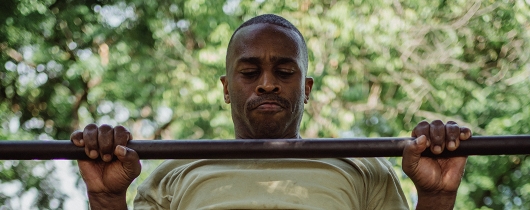Setting the Bar | Poniendo el Listón

St. Peter Claver
Colossians 3:12-17; Luke 6:27-38
Our life in Christ is both aspirational and practical. In today’s readings, St. Paul and Jesus set the bar high for us, but they also concretely describe what it means to live as a disciple.
Paul calls for us to cover ourselves with love, on top of several other virtues, to let Christ’s peace control our hearts, and to let God’s word dwell richly within us. What does that look like? We forgive, teach, and admonish each other. We pray. We praise God for his goodness and live with gratitude. Everything we say and do is in the name of Jesus.
That’s a lot.
Then Jesus asks us to go further: turn the other cheek; go the extra mile; give someone the shirt off our back; lend without expecting repayment; love our enemies; follow the Golden Rule; be merciful; and stop judging others.
Most of us could spend a lot of time working on only one or two of these things. The lists that Paul and Jesus give us seem overwhelming. Thankfully, God gives us a lifetime and all the graces and opportunities we need to work through them. The sobering reality, however, is that none of us can know with certainty how long our lives will be. All that God asks is that we use well the time we have.
St. Peter Claver lived into his early 70’s—a good, long life for someone in the 17th century. He dedicated many years to serving the human and spiritual needs of enslaved people. It affected his health, and it pushed him to the margins of society and even among his Jesuit brothers. The last years of his life, he was sick and almost abandoned. But in his final days and at his death, people could not deny his sanctity. Thousands mourned his passing. We pray for his courage, especially as the Church is called to fight the sin of racism, both within the body of Christ and in our wider world. - jc
----------------------------------------------------------------------------------------
San Pedro Claver
Colosenses 3:12-17; Lucas 6:27-38
Nuestra vida en Cristo es a la vez una aspiración y una práctica. En las lecturas de hoy, San Pablo y Jesús nos ponen el listón muy alto, pero también describen concretamente lo que significa vivir como discípulo.
Pablo nos pide que nos cubramos de amor, además de otras virtudes, que dejemos que la paz de Cristo controle nuestros corazones, y que dejemos que la palabra de Dios habite ricamente en nosotros. ¿Qué significa esto? Perdonamos, enseñamos y amonestamos a los demás. Rezamos. Alabamos a Dios por su bondad y vivimos con gratitud. Todo lo que decimos y hacemos es en el nombre de Jesús.
Eso es mucho.
Luego, Jesús nos pide que vayamos más allá: poner la otra mejilla; hacer un esfuerzo adicional; dar a alguien la camisa de nuestra espalda; prestar sin esperar reembolso; amar a nuestros enemigos; seguir la Regla de Oro; ser misericordiosos; y dejar de juzgar a los demás.
La mayoría de nosotros podría dedicar mucho tiempo a trabajar sólo en una o dos de estas cosas. Las listas que nos dan Pablo y Jesús parecen abrumadoras. Afortunadamente, Dios nos da toda una vida y todas las gracias y oportunidades que necesitamos para trabajar en ellas. Sin embargo, la realidad aleccionadora es que ninguno de nosotros puede saber con certeza cuánto durará nuestra vida. Lo único que Dios nos pide es que utilicemos bien el tiempo que tenemos.
San Pedro Claver vivió hasta los 70 años, una buena y larga vida para alguien del siglo XVII. Dedicó muchos años a atender las necesidades humanas y espirituales de las personas esclavizadas. Esto afectó a su salud, y le empujó a los márgenes de la sociedad e incluso entre sus hermanos jesuitas. Los últimos años de su vida estuvo enfermo y casi abandonado. Pero en sus últimos días y en su muerte, la gente no podía negar su santidad. Miles de personas lloraron su muerte. Rezamos por su valentía, especialmente cuando la Iglesia está llamada a luchar contra el pecado del racismo, tanto dentro del cuerpo de Cristo como en nuestro mundo más amplio. - jc




